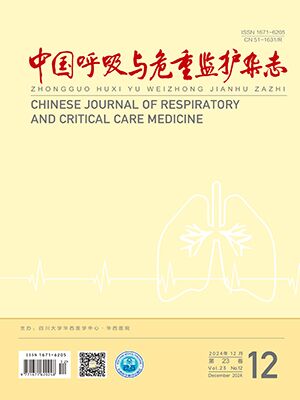| 1. |
American Cancer Society. Cancer facts and figures. 2017, http://www.cancer.org/research/cancerfactsstatistics/cancerfactsfigures2017/index.
|
| 2. |
Yanwei L, Dongying L, Zhuchen Y, et al. A double-edged sword: should stage IV non-small cell lung cancer patients be informed of their cancer diagnosis?. Eur J Cancer Care (Engl), 2017, 26(6): e12665.
|
| 3. |
Erol Y, Çakan A, Ergönül AG, et al. Psychiatric assessments in patients operated on due to lung cancer. Asian Cardiovasc Thorac Ann, 2017, 25(7-8): 518-521.
|
| 4. |
沈渔邨主编. 精神病学. 第 5 版. 北京: 人民卫生出版社, 2011, 269-273.
|
| 5. |
Haun MW, Sklenarova H, Villalobos M, et al. Depression, anxiety and disease-related distress in couples affected by advanced lung cancer. Lung Cancer, 2014, 86(2): 274-280.
|
| 6. |
Wei D, Tian Y, Gao H, et al. Patient distress and emotional disclosure: a study of Chinese cancer patients. J Cancer Educ, 2013, 28(2): 346-351.
|
| 7. |
Chen J, Li W, Cui L, et al. Chemotherapeutic response and prognosis among lung cancer patients with and without depression. J Cancer, 2015, 6(11): 1121-1129.
|
| 8. |
Molassiotis A, Charalambous A, Taylor P, et al. The effect of resistance inspiratory muscle training in the management of breathlessness in patients with thoracic malignancies: a feasibility randomised trial. Support Care Cancer, 2015, 23(6): 1637-1645.
|
| 9. |
Salsman JM, Garcia SF, Yanez B, et al. Physical, emotional, and social health differences between posttreatment young adults with cancer and matched healthy controls. Cancer, 2014, 120(15): 2247-2254.
|
| 10. |
Aukst Margetic B, Kukulj S, Santic Z, et al. Predicting depression with temperament and character in lung cancer patients. Eur J Cancer Care (Engl), 2013, 22(6): 807-814.
|
| 11. |
Xie H, Li C, He Y, et al. Chronic stress promotes oral cancer growth and angiogenesis with increased circulating catecholamine and glucocorticoid levels in a mouse model. Oral Oncol, 2015, 51(11): 991-997.
|
| 12. |
Cosci F, Fava GA, Sonino N. Mood and anxiety disorders as early manifestations of medical illness: a systematic review. Psychother Psychosom, 2015, 84(1): 22-29.
|
| 13. |
Pirl WF, Greer JA, Traeger L, et al. Depression and survival in metastatic non-small-cell lung cancer: effects of early palliative care. J Clin Oncol, 2012, 30(12): 1310-1315.
|
| 14. |
Akechi T, Okamura H, Nishiwaki Y, et al. Psychiatric disorders and associated and predictive factors in patients with unresectable nonsmall cell lung carcinoma: a longitudinal study. Cancer, 2001, 92(10): 2609-2622.
|
| 15. |
Krebber AM, Buffart LM, Kleijn G, et al. Prevalence of depression in cancer patients: a meta-analysis of diagnostic interviews and self-report instruments. Psychooncology, 2014, 23(2): 121-130.
|
| 16. |
Mitchell AJ, Chan M, Bhatti H, et al. Prevalence of depression, anxiety, and adjustment disorder in oncological, haematological, and palliative-care settings: a meta-analysis of 94 interview-based studies. Lancet Oncol, 2011, 12(2): 160-174.
|
| 17. |
Neron S, Correa JA, Dajczman E, et al. Screening for depressive symptoms in patients with unresectable lung cancer. Support Care Cancer, 2007, 15(10): 1207-1212.
|
| 18. |
Konings IC, Harinck F, Kuenen MA, et al. Factors associated with cancer worries in individuals participating in annual pancreatic cancer surveillance. Fam Cancer, 2017, 16(1): 143-151.
|
| 19. |
Nishiura M, Tamura A, Nagai H, et al. Assessment of sleep disturbance in lung cancer patients: relationship between sleep disturbance and pain, fatigue, quality of life, and psychological distress. Palliat Support Care, 2015, 13(3): 575-581.
|
| 20. |
Fegg M, Kraus S, Graw M, et al. Physical compared to mental diseases as reasons for committing suicide: a retrospective study. BMC Palliat Care, 2016, 15: 14.
|
| 21. |
Maric D, Jovanovic D, Nagorni-Obradovic L, et al. Assessment of health-related quality of life in end-stage chronic obstructive pulmonary disease and non-small-cell lung cancer patients in Serbia. Palliat Support Care, 2016, 14(1): 60-68.
|




